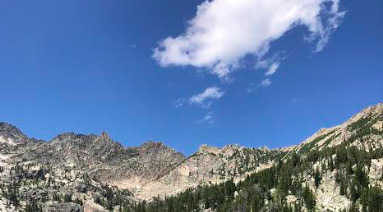Yosemite National Park ranger Shelton Johnson connects communities of color to the naturally beautiful national parks system through the history of their communities and how that ties in with the land. Johnson joined the Nelson Institute for Environmental Studies for a Jordahl Public Land Lecture to share his experiences as a 34-year veteran of the National Park Service.
As a five year old, Johnson ventured with his mother and father, who was stationed in Germany, to Berchtesgaden, perched high up in the Bavarian Alps near the border of Austria. He said the visual and sensory impact of the towering depths with shadows on clouds below him was “the apex of that edge between space and between earth itself.” This moment stuck with him and inspired his decision to become a ranger to this day.
“That’s the power of a childhood experience in the mountains, the desert or the forests,” Johnson said. “It is a baptism. It is a door opening. It is a portal to the spirit and to the universe itself.”
Environmental justice talk highlights importance of ecosystems of equity
Following that experience, Johnson spent most of his childhood in industrial city settings. Until he journeyed to Montana and Wyoming in the Yellowstone region, where he felt a sense of connection and homecoming to that pinnacle memory of his childhood. He said he felt a “blood relationship” with the land.
Johnson said he was the only African American in uniform in Yellowstone National Park in the late ’80s, and he felt responsible to perform at his absolute best in order to represent his heritage.
“It was a greater burden because you didn’t have that anonymity,” Johnson said. “You were really just out there, and everyone knew that you were there. So you just adjust to it, and you move forward.”
Johnson also drew inspiration from discovering a photograph of five African American men in uniform for the United States. He said he felt these men were staring through the distance of 100 years to see the future lineage, and his role as a park ranger was an “echo textile” of the uniforms they wore before him.
UW lab discovers trees can change genetic structure to compete for resources
Now, Johnson works as a community outreach specialist at Yosemite National Park. He said millions of Black, Latine and Asian American people near the pacific coast don’t visit national parks, and he felt responsible to show them that in the vast beauty of a national park, everyone is the same.
“The separation that we’ve created between ourselves and the natural world around us is not the way to go,” Johnson said. “We need integration in terms of culture and race.”
Dean of the Nelson Institute for Environmental Studies Paul Robbins began the talk by acknowledging the history of the land at University of Wisconsin. He said the land on campus is ancestral to the Dejope nation, and an 1832 treaty forced the Ho-Chunk to see the land occupied by UW.
Johnson comes from Cherokee, Choctaw, Seminole, African and Irish heritage, and he wants to see progress in giving back to his ancestry. He said the industrial revolution lost values that connect people to the land, and there could be much to learn from First Nations.
“I see it from my point of view as Native people [who] are still tied to the ancestral ways. They’re the great teachers to teach us what we’ve not just forgotten but what we let go,” Johnson said. “And that is that specific kinship, ancestral connection to the earth itself.”
Meet the Indigenous student org improving First Nations’ representation in STEM
Johnson said the importance of national parks is larger than the credit given to them. They are more than reserves of biodiversity, but a wilderness area that is undisturbed.
Labeling areas of wilderness as a resource is an imperfect term because it undermines the connection between person and space. Along the evolutionary history of life, humans are the first species on earth on the precipice of making itself alien to its own world, Johnson said.
“We are alive because the Earth is alive, and because the Earth is alive, we are alive as well,” Johnson said. “That connection is so important that if we lose it, we lose ourselves, we lose everything.”
This story was updated at 11:15 p.m. on Oct. 19 to correct that Johnson was the only African American working at Yellowstone National Park in the 80s. The previous version said he was the only African American working in the National Park Service in the 80s.


















